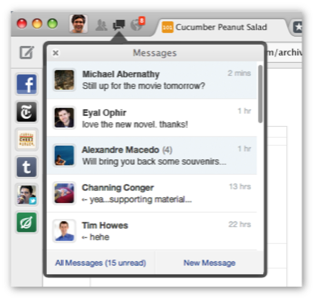RockMelt, the “social Web browser” built on top of Chromium, the open source version of Google’s Chrome browser, has now partnered with Facebook on a new version, RockMelt Beta 3, out today. The updated software includes over 30 new features, including improved Facebook Chat and notifications, and a smart feature that knows when you’re on Facebook.com. When Facebook.com is detected, RockMelt will deliver a more streamlined appearance where certain Facebook features are removed from the website and displayed within the Web browser itself.


Biggest New Features: Notifications, Messages, Friend Requests Built-in, Plus Better Chat
According to RockMelt, one of the biggest feature requests was for tools to manage Facebook friend requests, messages and notifications right in the browser. This is now a notable new addition in RockMelt 3, where all three can be found at the top-left corner, similar to Facebook’s own website. You can also confirm friend requests and compose messages within the browser.

Facebook Chat has been improved too, with a revamp of the “Friend Edge” – the feature which displays your friend list alongside the browser window. Now this Friend Edge offers an expandable view where you can see your friends’ full names and pictures or even search the list by name. You can also scroll through the list or move the list to the other side of the browser if you prefer.

Special Version of Facebook.com Designed for RockMelt
One of the more interesting new features is the new version of Facebook.com that is displayed when you visit the website from RockMelt. Built with Facebook’s help, this new, simplified website removes all redundancies, such as the Friend Requests, Messages, Notifications and friend lists, which are just displayed in RockMelt.
Other Features
In total, there are 31 new features in the update, including the following:
- Brand New Friend Edge
- Expandable View with names and favorite status
- Scrollable Friend Edge
- Swappable Friend Edge and App Edge
- Friend search in Friend Edge
- Chat status can now be changed to online / offline even easier
- Option to hide offline friends
- Improved context menu when right-clicking friends
- Unified View of Friends: Favorite Friends and Other Friends now shown together
- Drag-and-drop to remove or add friends to Favorites
- Confirm and reject Friend Requests added
- View and reply to Messages added
- See Notifications and the associated item of interest (status updates, links, or photos)
- Universal chat experience from RockMelt – no more duplicate chat windows and friend lists
- Initiating chats on Facebook.com will open chats in RockMelt
- Universal Friend Requests, Messages and Notifications right in RockMelt – no more duplicates on Facebook.com
- New Facebook App with Photo Album Viewer
- Quick access to your own Facebook Profile
- Better Chat with Previous chat history now shown when chatting with friends, improved notification when chats are received and a simplified chat window
- Easy status updater
- One-click Quiet Mode button
- Twitter: Option for growl and taskbar notifications for incoming tweets
- (Mac) Scrollable App Edge so you can get updates from even more Apps
- (Mac) Share Improvements
- Quick image picker – just click on the embedded image to see all the ones that can be selected
- Link titles and descriptions can now be edited
Facebook’s Involvement?
Facebook’s involvement with RockMelt, however, begins and ends with this collaboration. The company has no plans to help distribute the Web browser to its end users, Ethan Beard, director of platform partnerships told The New York Times. That means that RockMelt will rely on word-of-mouth and its own marketing to spread to new users, which will be a challenge. Many don’t even know what a Web browser is, as Google sadly discovered, much less how to download a new one.
It’s also unclear if RockMelt is truly solving a problem here. Is Facebook actually a better experience as a Web browser than as a website? Or is it more of a distraction? Does it do anything better than the website itself, or does it just do it differently?
Despite its high-profile backers – RockMelt was funded by Netscape co-founder Marc Andreesen – it’s not the first company to attempt a “social” Web browsing experience. Flock, a one-time up-and-comer in this same space recently failed, and support for both its Firefox and Chrome-based versions was shut down in April of this year. While Flock had a number of other challenges, too, one was simply that it failed to convince users that social networking needed to be integrated with the browser itself. Whether RockMelt will go the same route is yet to be seen.
















